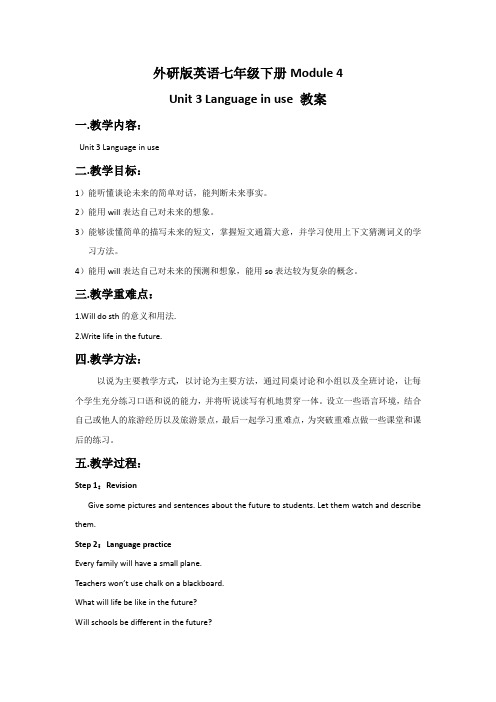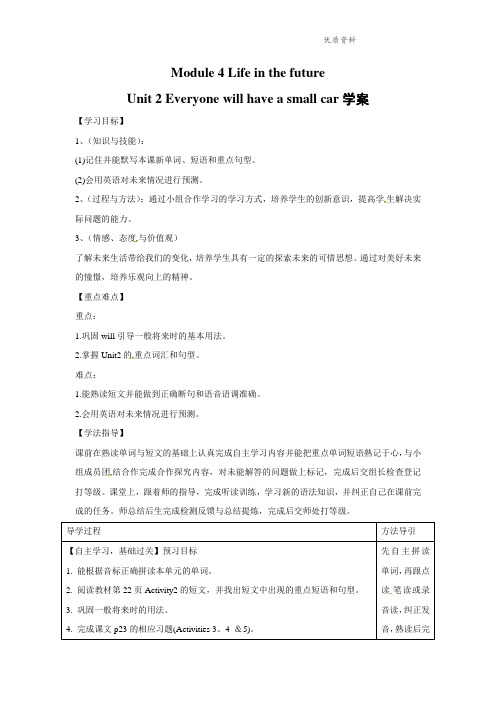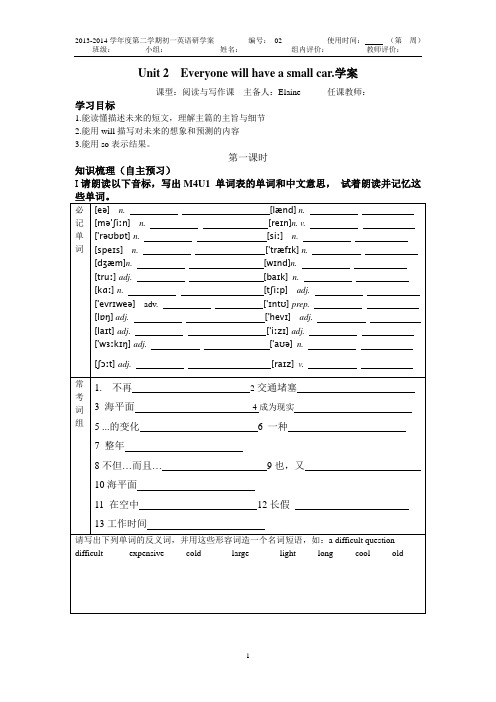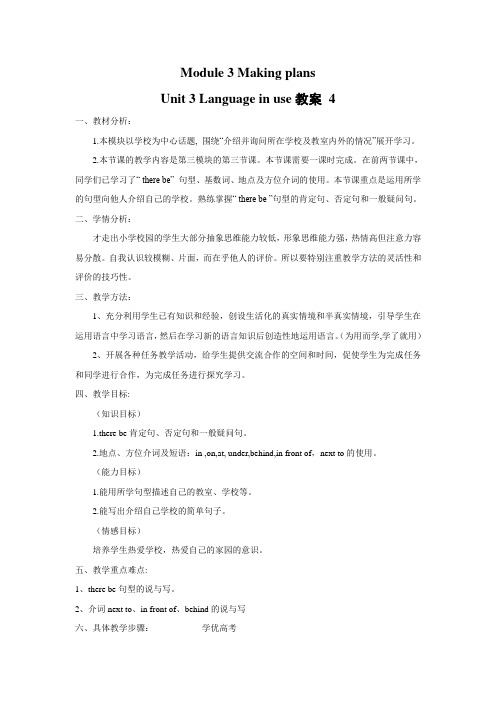英语外研标准版七下学案4 Module 2 Unit 3
- 格式:doc
- 大小:47.00 KB
- 文档页数:7

外研版英语七年级下册Module 4Unit 3 Language in use 教案一.教学内容:Unit 3 Language in use二.教学目标:1)能听懂谈论未来的简单对话,能判断未来事实。
2)能用will表达自己对未来的想象。
3)能够读懂简单的描写未来的短文,掌握短文通篇大意,并学习使用上下文猜测词义的学习方法。
4)能用will表达自己对未来的预测和想象,能用so表达较为复杂的概念。
三.教学重难点:1.Will do sth的意义和用法.2.Write life in the future.四.教学方法:以说为主要教学方式,以讨论为主要方法,通过同桌讨论和小组以及全班讨论,让每个学生充分练习口语和说的能力,并将听说读写有机地贯穿一体。
设立一些语言环境,结合自己或他人的旅游经历以及旅游景点,最后一起学习重难点,为突破重难点做一些课堂和课后的练习。
五.教学过程:Step 1:RevisionGive some pictures and sentences about the future to students. Let them watch and describe them.Step 2:Language practiceEvery family will have a small plane.Teachers won’t use chalk on a blackboard.What will life be like in the future?Will schools be different in the future?Yes, they will.Step 3:Complete the questions about the future.Will students go (go) to school in the future?1. _____________ (use) pens and paper?2. _____________ (read) books?3. _____________ (travel) by small plane?4. ____________ (send) emails to teachers?Step 4:Work in pairs. Ask and answer the questions in Activity 1.—Will students go to school in the future?—Yes, they will. / No, they won’t. They’ll study at home.Step 5:Put the words in brackets in the correct place in the sentences.They’ll have a lot of time! (free)They’ll have a lot of free time!Step 6:Around the world.This passage talks about the Robots in JapanStep 7:Module task——Making a poster about life in the future in your hometown. Think about life in the future. Write down your ideas.* Schools * Homes * Travel * WeatherStep 8:HomeworkReview and recite the important points of Module 4.。

Module 1 Unit1 学案学习目标:用现在进行时描述当前正在进行的事情。
学习任务:第一部分知识要点1. 词汇:buy________ call ________ drive _________ enjoy _________lie ________ shop _________ take _________ tell ________wait __________ for __________ postcard __________ really _________anyway _________2. 习语:|talk to ___________ be on a school trip _______________have a good time _______________ take pictures/ photos _____________lying in the sun _______________ send sb. sth. ____________wait for ______________第二部分语法学习如果要表达现在正在做的事情,该如何表达请观察下面的例句:They are lying in the sun. 他们正躺在太阳下。
Are they waiting for the bus. 他们正在等公共汽车吗从以上例句可以看出,现在进行时的谓语形式是be +动词ing. Be动词随人称、数而变化。
1. 试写出下列动词的+ing 形式。
/buy _______ lie _______ enjoy ________ have _________ run ________write _______ wait _________ shop ________ like _________2. 根据汉语提示写出下列英语句子。
1) 我们正在上英语课。
We _______ ________ an English class.2) 她不是在和她妈妈讲话。

Module 4 Life in the futureUnit 2 Everyone will have a small car学案【学习目标】1、(知识与技能):(1)记住并能默写本课新单词、短语和重点句型。
(2)会用英语对未来情况进行预测。
2、(过程与方法):通过小组合作学习的学习方式,培养学生的创新意识,提高学生解决实际问题的能力。
3、(情感、态度与价值观)了解未来生活带给我们的变化,培养学生具有一定的探索未来的可惜思想。
通过对美好未来的憧憬,培养乐观向上的精神。
【重点难点】重点:1.巩固will引导一般将来时的基本用法。
2.掌握Unit2的重点词汇和句型。
难点:1.能熟读短文并能做到正确断句和语音语调准确。
2.会用英语对未来情况进行预测。
【学法指导】课前在熟读单词与短文的基础上认真完成自主学习内容并能把重点单词短语熟记于心,与小组成员团结合作完成合作探究内容,对未能解答的问题做上标记,完成后交组长检查登记打等级。
课堂上,跟着师的指导,完成听读训练,学习新的语法知识,并纠正自己在课前完成的任务。
师总结后生完成检测反馈与总结提炼,完成后交师处打等级。
导学过程方法导引【自主学习,基础过关】预习目标1. 能根据音标正确拼读本单元的单词。
2. 阅读教材第22页Activity2的短文,并找出短文中出现的重点短语和句型。
3. 巩固一般将来时的用法。
4. 完成课文p23的相应习题(Activities 3、4 &5)。
先自主拼读单词,再跟点读笔读或录音读,纠正发音,熟读后完Unit 2 ( 10 min )一、单项选择( )1. Planes will be very large, so _________ will be very cheap.A. flyB. flyingC. to flyD. flies( )2. This is ________ interesting book. Do you want to get it ?A. an B .a C. the D. /( )3.We go to school five days _______ week.A. inB. anC. theD. a( )4. ________ books in bed is bad for your eyes.A. ReadB. ReadingC. ReadsD. Read to( )5.The boy often uses his computer ________ his friends emails.A. sendB. sendingC. to sendD. sent二、用所给词的反义词填空1. I think that job is very ________ ( easy ) for him to do.2. Tomorrow my father will be _________ ( busy ), and he doesn’t have work to do.3. The new p encil is ____________ ( long ).4. This new English storybook is very _________( dull ).5. My father thinks fuel will be ___________ ( cheap) in the future.三、根据汉语提示完成句子1. Planes will be ______(很大) , so ________( 坐飞机) will be ________(很舒适).2. It will be hot _________(整年), s o the winter ________________(将会很短).3. Maybe there will be _______________(交通拥堵) in the future.4. Computers will be ____________(很小), so they will be ___________(很轻).5. _________(在春天), the weather is very warm.Keys:一、单项选择1.B2.A3.D4.B5.B二、用所给词的反义词填空1.difficlt2.free3.short4.intersting5.expensive 在自主预习与师的引导与补充后,完成当堂检测,并小组测评,打出分数,评出优胜小组。

Module 4 Life in the futureUnit 2 Everyone will have a small car教学案一、学习目标:1.会读、会写本课的新词汇和短语;能基本理解并朗读本单元的短文。
2.能读懂叙述未来的短文,掌握整体理解的技能,理解余片的主旨和细节。
3.能用“will”表达自己对未来的预测和想象;能用“so”表达较为复杂的概念。
二、学习重点:本单元涉及的知识点。
三、学习难点:Will表示将来的特殊疑问句;there be句型将来时的表达。
课前预习一、使用说明与学法指导:1. 巩固掌握本单元重点单词、短语及句型。
2. 将预习中不能解决的问题标出来,并写在我的疑问处。
二、教材助读:1、熟读单词:air, land, machine,robot, space, wind, car, cheap, everywhere, long, heavy, light2、熟读短语:come true, no more, all year, as well, not only...but also3、熟读句型:(1.)What will life be like in the future?(2.)Here are some ideas.(3.)They’ll be warm when we’re cold,and cool when we’re hot.三、预习自测:单词拼写(1)Is the story about Tom __________(真实的)?(2)I think I will have a __________(机器人)at my hom e in the future.(3)Don’t litter __________(到处) when you visit a park.(4)The sun _______(升起) in the east every day.(5)There are twenty-four __________(小时) in a day.Keys:(1)true (2)robot (3)everywhere (4)rises (5)hours四、我的疑惑:______________________________________________________课内探究知识点导学1)What will life be like in the future? 未来的生活会怎么样?2)Which ones will come true? 其中那些会变成现实呢?例如:He hopes his dreams come true. 他希望他的梦想成真。

Unit 2 Everyone will have a small car.学案课型:阅读与写作课主备人:Elaine 任课教师:学习目标1.能读懂描述未来的短文,理解主篇的主旨与细节2.能用will描写对未来的想象和预测的内容3.能用so表示结果。
第一课时知识梳理(自主预习)I请朗读以下音标,写出M4U1 单词表的单词和中文意思,试着朗读并记忆这ⅡTeaching Steps (走进课堂)1) Choose the correct answers(选出正确答案)①Why will flying be very cheap?A. There will be more cars.B. Fuel(燃料)will be very cheap.C. Everyone will have a small planes.D. Planes will be very large.②_____ will do heavy or difficult jobs in the future.A. People B. Robots C. Machines D Robots and machines③The summer will be ________ and the spring will be _______.A. warm, coolB. hot, coldC. cool, warmD. hot, warmTask 5 Writing 写作随着科技的发展,越来越多的机器人被制造出来,除了大量应用于工业外,机器人也走进人们的生活,几乎每个家庭有一个机器人。
请以Robots at home in the future为题,写一篇短文,谈谈机器人在未来家庭中的应用情况(比如:打扫卫生、洗衣、做饭、照顾老人和小孩等)。
要求:1、条理清楚、意思连贯、语句通顺、标点正确。
2、50-60词。
Robots in the futureIn the future, there will be a robot in everyone’s home._______________________________________________________________________________ _______________________________________________________________________________ _______________________________________________________________________________ _______________________________________________________________________________ _______________________________________________________________________________ _______________________________________________________________________________ _______________________________________________________________________________ _______________________________________________________________________________ ⅢTest after class(课后检测).1)根据汉语提示完成下列句子,每空一词。

Module 3 Making plansUnit 3 Language in use教案4一、教材分析:1.本模块以学校为中心话题, 围绕“介绍并询问所在学校及教室内外的情况”展开学习。
2.本节课的教学内容是第三模块的第三节课。
本节课需要一课时完成。
在前两节课中,同学们已学习了“ there be” 句型、基数词、地点及方位介词的使用。
本节课重点是运用所学的句型向他人介绍自己的学校。
熟练掌握“ there be ”句型的肯定句、否定句和一般疑问句。
二、学情分析:才走出小学校园的学生大部分抽象思维能力较低,形象思维能力强,热情高但注意力容易分散。
自我认识较模糊、片面,而在乎他人的评价。
所以要特别注重教学方法的灵活性和评价的技巧性。
三、教学方法:1、充分利用学生已有知识和经验,创设生活化的真实情境和半真实情境,引导学生在运用语言中学习语言,然后在学习新的语言知识后创造性地运用语言。
(为用而学,学了就用)2、开展各种任务教学活动,给学生提供交流合作的空间和时间,促使学生为完成任务和同学进行合作,为完成任务进行探究学习。
四、教学目标:(知识目标)1.there be肯定句、否定句和一般疑问句。
2.地点、方位介词及短语:in ,on,at, under,behind,in front of,next to的使用。
(能力目标)1.能用所学句型描述自己的教室、学校等。
2.能写出介绍自己学校的简单句子。
(情感目标)培养学生热爱学校,热爱自己的家园的意识。
五、教学重点难点:1、there be句型的说与写。
2、介词next to、in front of、behind的说与写六、具体教学步骤:学优高考Step 1.Ask and answer. 出示图片,通过问答的形式,掌握there be句型一般疑问句及其回答。
Are there any computers on the desks ? 学优高考网gkstk]No, there aren’t.Are there any computers on the desks?Yes, there are 学优高考网gkstk]Are there any computers on your desks ?No, there aren’t.Is there a computer on Mr. Li’s desk?学优高考网gkstk]No, there isn’t.Step 2. Introduce our classroom。
Module 4 Life in the futureUnit 2 Life in the future.学案一.学习目标:1.知识目标:通过自主探究,掌握本单元的词汇及短语。
2.能力目标:能读懂叙述未来的短文,掌握整体理解技能,理解概念之间的上下义关系。
3.情感目标:通过短文的学习,能够增强环保意识。
二.学习重、难点:1. 学会对文章整体把握。
2. So 的用法。
三.预备知识:1.写出下列形容词的反义词。
○1cheap-- ○2short- ○3rough-○4strong- ○5comfortable- ○6light-○7dull- ○8free- ○9easy-○10good- ○11 cool- ○12 hot-○13new- ○14 large-2.翻译下列短语:○1一年到头_______ ○2变暖________ ○3暴雨________○4北极_________ ○5恶劣天气______ ○6强风_______○7许多_______ ○8枯燥的工作____ ○9重活______○10一周三天_____ ○11在冬季______ ○12空闲时间____3.重点句型。
○1Planes will be very large so flying will be very cheap.飞机将会很大,所以乘飞机旅行会很便宜的。
So 在本句中用作连词,意为“所以”。
在表示“因为…..所以…”的句子中“because”和“so”只能用其中的一个,切记不能两者并用。
Flying在句中的用法:参阅language notes P138.______ (drink) milk is good for you.______(walk) and ________ (swim) are good exercises.用so 连接句子:Activity8.○2We will use the sun to heat our homes.我们将利用太阳能为住宅供暖。
Module 2 What can you do?Unit 3 Language in use第三课时学案4一、学习目标:A.单词和短语:play, tennis, piano, ride, club, term, board, would like, well, all, that’s all, worry, worry about, teach, then, monitor, start, get on well with sb. ready, ready to do sth. promise, fast, fit, just, ball, game, team, best, score, tidy, sure, everybody, just like, beautiful, fly, kite, swim.B.交际用语:1. Look!2. What about you?3. Don’t worry about….4. I can play piano.5. I can’t speak Chinese very well.6. —Can you cook? —Yes, I ca n. / No, I can’t.7. —Can Betty speak English? —Yes, she can.8. —Can Tony speak Chinese well? —No, he can’t.9. I’d like to be …10. I want to be ….11. I can play the piano.12. She can dance really well.13. We can teach you Chinese!14. — Can you fly a kite?—Yes, I can. / No, I can’t.C. 教学目标1. Function Finding out what people can do; asking and answering about abilities2. Structure can / can’t3. Skills: 1) Listening and finding out about people’s abilities.2) Supplying information on people’s abilities.3) Reading and understanding simple passages, finding specific information4) Composing a simple passage4. Around the world : Languages5. Task: Making a poster for a club.二、重点及难点:情态动词can / can’t的用法三、教学设计:Unit 3 Language in useⅠTeaching modelRevision and applicationⅡTeaching methodFormal and interactive practiceⅢTeaching aims1. Function Finding out what people can do; asking and answering about abilities2. Structure can / can’t3. Around the world : Languages4. Task: Making a poster for a club.ⅣTeaching ObjectivesKey structures : I can play the piano.She can dance really well.We can teach you Chinese!Can you cook?Yes, I can. / No, I can’t.ⅤTeaching aidsTape recorder, OHP, handoutsⅥTeaching StepsStep 1 RevisionShow some pictures to review the text of Unit 1 and Unit 2 .Step 2 Language practice1. Read through the example sentences in the box with the whole class.2. Ask the students to repeat the sentences in the box.Step 3 Work in pairs1. Ask the students to look at the table in Activity 1.Student 1 Student 2 StudentActivityfly a kiteplay the pianocookplay table tennisride a bike…2. Add two or three more activities to the list.3. Ask the students to write questions for each activity.Can you fly a kite?…4. Work with another pair. Ask and answer the questions you wrote in Activity 1. — Can you fly a kite?—Yes, I can. / No, I can’t.5. Give a report of your questions and answers to the rest of the class.Step 4 Complete the sentences.1. Read through the sentences in Activity 3.1. — ________ you swim?— Yes, but I _______ swim well.2. — Are you coming with us?— Sorry, I ______ ride a bike.3. — What _______ the new cleaning monitor do for us?— He ________ make our classroom tidy.4. — ________ you play the piano for us?— Sorry, I _______ play the piano, but I _______ sing for you.2. Complete the sentences with can or can’t.3. Ask the students to check with a partner.4. Check the answers:Keys: 1. can; can’t 2. can’t 3. can; can 4. Can; can’t; c anStep 5 Complete the passage.1. Ask the students to read the words in the box in Activity 5.beautiful Chinese monitor piano tidy2. Read through the passage in Activity 5.I like playing the (1)__________. I am Chinese so I can speak (2)__________ very well and I can speak English too. I am very (3)__________ and I help my mum to clean our home. I want to be the cleaning (4)__________ at school because I want to make our classroom (5)__________.3. Complete the passage with the correct form of the words from the box.4. Ask the students to check with a partner.5. Check the answers:Keys: 1. piano 2. Chinese 3. tidy 4. monitor 5. beautifulStep 6 Around the world: Languages.1. Show some pictures2. Ask the students to look at the picture and discuss what they can see.3. Talk something about the countries and languages.There are six official languages of the United Nations. Can you speak these languages? Can you write them?Chinese English Spanish你好!Hello! iHola!French Russian ArabicBonjour Здравствуйтеملاسلامكيلع4. Read through the information with the whole class.Step 7 Module task: Making a poster for a club.1. Work in groups of three or four. Talk about a new school club.Choose a name for the club.Choose a day and time for the club.2. Ask people to join the club.Music ClubCan you sing?Can you play the piano?Come and join the Music Club!Mondays 4: 30 pmThe Music RoomStep 8 Grammar情态动词can的用法:一、基本用法1. 表示能力(如体力和脑力方面),意为“能;会”等。